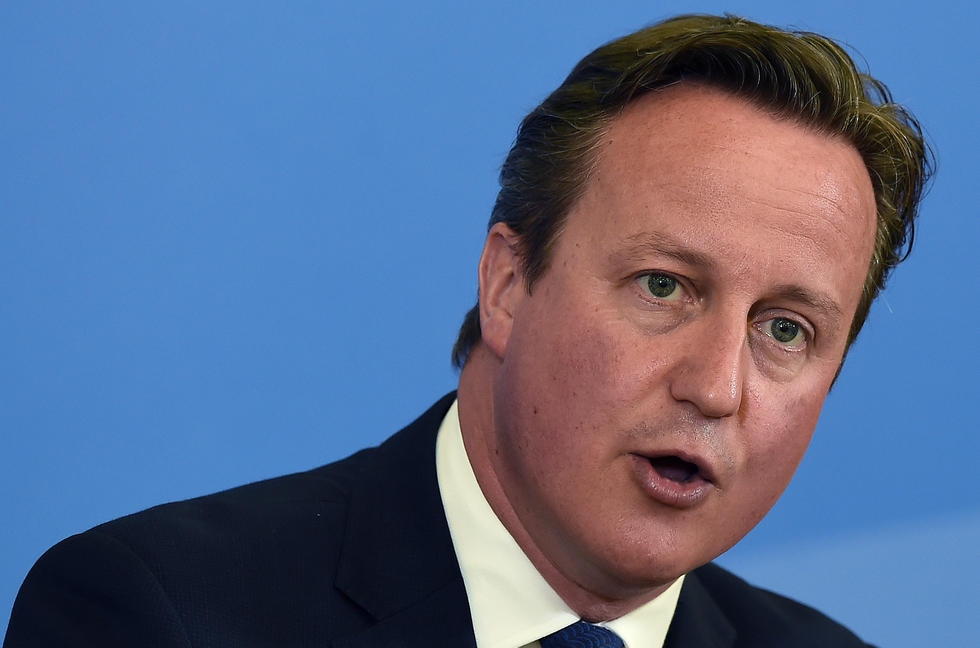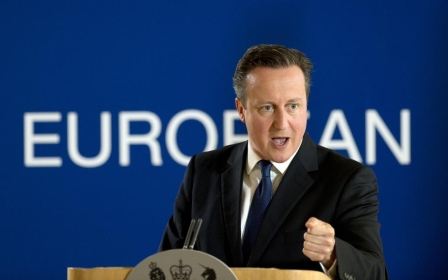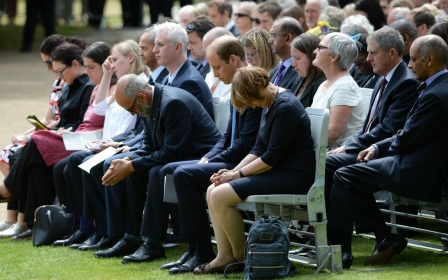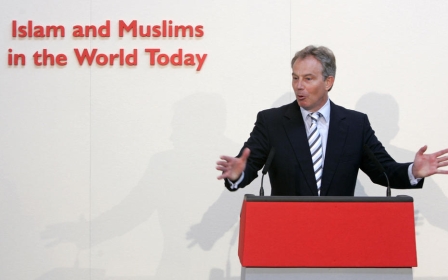Cameron follows Blair in criminalising the Muslim community

As an ardent critic of British foreign policy and its significant contributing role in the radicalisation of Muslims, I was shocked by Prime Minister David Cameron’s speech yesterday, where he set out the government’s five-year plan in tackling extremism.
For those who recall Tony Blair’s speech at the World Affairs Council in Los Angeles in 2006, many would argue that Cameron’s speech was neither landmark nor innovative in terms of policies. Rather, the hour-long ramble at Ninestiles School in Birmingham appeared to be a rehashed regurgitation of the same rhetoric delivered by the prime minister who gave us the Iraq war, which subsequently created the vacuum from which ISIS emerged.
Going over Cameron’s entire speech, it contained a number of inconsistencies, political selectiveness, and statements of unadulterated intolerance best suited to an authoritarian dictator. The role of Muslim parents in preventing radicalisation, “conspiracy theories” about 9/11, 7/7 and Israel, the “enforcing of British values,” lack of integration, and non-violent extremism, were some of the areas covered by the prime minister.
Generational struggle
Cameron alluded to a “generational struggle” where disenfranchised Muslims have been won over by extreme Islamist ideas, instead of espousing the values of their birthplace. He conveniently forgot that for 14 years, Muslims who grew up during the “war on terror” like myself, were inundated with images and videos of dismembered corpses of Afghans and Iraqis, the bombing of two sovereign Muslim countries, endless cases of inhumane torture at Bagram, Abu Ghraib and Guantanamo Bay, the rise of Islamophobia and increasing anti-Muslim hate crime at home, as well as a relentless government strategy to redefine aspects of normative Islam.
Without taking the aforementioned context into consideration, how much of this “generational struggle” can be wholeheartedly blamed on Islamist extremism, as opposed to the wrongdoings of successive British governments? Nevertheless, these factors have not prevented the vast majority of British Muslims from integrating into this country, progressing in a wide spectrum of professions, and contributing towards the betterment of the UK.
Naming and shaming
It came as no surprise when David Cameron condemned the National Union of Students (NUS) for allegedly supporting advocacy group CAGE. His frustration could have built up after a joint statement was published last week, signed by 280 academics and NUS members, calling for the abolition of the Prevent strategy. It was also rather disingenuous that Cameron uncompromisingly labelled CAGE as non-violent extremists, two days before the group’s legal case against the Charity Commission. It continues to amaze me how a small organisation in the heart of east London has managed to cause such an earthquake in the heart of the political establishment.
CAGE was not the only Muslim organisation in the firing line. When an ITV journalist quoted Ramadhan Foundation in saying that the government “had not done enough” in engaging with the Muslim community in tackling extremism, Cameron bluntly dismissed this as “groups claiming to represent Muslims but are from it”. Shortly after, the Muslim Public Affairs Committee UK (MPACUK) was also shunned by the Prime Minister as a group “not to be taken seriously” when claiming to represent the Muslim community.
The futile naming and shaming of groups followed an earlier comment in Cameron’s speech that “condemning ISIS is not enough” - making it clear that Muslims either adopt the government’s narrative on ISIS and the causes of radicalisation, or risk being labelled extremists. In effect, the Prime Minister has broadened the net for those who will now be categorised as “Islamist extremists” - and by default, with his own words, swelling the numbers of the very same “disease” he’s trying to eradicate.
Maajid Nawaz and the Quilliam Foundation
I guess the greatest irony of Cameron’s crusading speech was that Maajid Nawaz of the Quilliam Foundation helped put it together. Why a failed Liberal Democrat parliamentary candidate assisted the leader of the Conservative Party in formulating a speech on policy baffles me.
However, what’s more comical is that this is the same individual who outraged the Muslim community for posting caricatures of the Prophet Muhammad, and was exposed by the Daily Mail for harassing a female dancer whilst drunk at an east London strip club during the holy month of Ramadan; did the Prime Minister ever question how “representative” Nawaz and the Quilliam Foundation were of the Muslim community? It was former Metropolitan chief superintendent Dal Babu who highlighted the highly problematic choice of allocating taxpayers money to the Quilliam Foundation, which he said was viewed with deep suspicion, and had minimal or no support in the Muslim community.
Like his predecessor, Cameron is refusing to engage with Muslim organisations with grassroots support in tackling extremism, be it the Muslim Council of Britain (MCB) who the Prime Minister dismissed as “having a problem” over extremism, or Muslim Engagement and Development (MEND) that was tarnished by The Telegraph as “entryists” with an Islamist agenda during the run up to the general election.
What now?
The question many Muslims are now anxiously asking is: “How will the Prime Minister’s speech manifest into policy?” Undoubtedly, Cameron’s rhetoric strongly indicated a radical policy shift in how this government will engage the Muslim community in the years to come.
By expanding on the definition of extremism, and essentially grouping hundreds of thousands of peaceful law-abiding British Muslims into the same camp as ISIS, the Prime Minster has only worsened the next five years of his term as the leader of this country. By allowing neoconservative think tanks like the Henry Jackson Society and non-entities like the Quilliam Foundation to influence policies, the Prime Minister has shown his lack of sincerity and seriousness in tackling the problem at hand.
Like the overwhelming number of British Muslims who highlighted the role of Western foreign policy as a contributing factor towards radicalisation, I fear that legitimate political dissent, a supposed fundamental British value enshrined in the Magna Carta, is being aggressively censored.
Personal concerns
What I find more alarming is that my personal religious beliefs in the concept of a Caliphate, Shariah law, and jihad - in a particular context and reality - which is in line with the scholarly consensus of the four Sunni schools of jurisprudence, is being criminalised under the banner of “combating ISIS ideology”.
In light of Cameron’s speech, does this mean that Muslims who hold certain religious views that are not palatable to secular liberalism will be flagged whenever they apply for jobs, adoption and to universities?
Does this muscular approach in forcing Muslims to assimilate to secular liberal values under the facade of “integration” mean that Muslim parents who hold particular normative Islamic beliefs and political opinions will be targeted by the authorities as protagonists behind radicalisation?
As a journalist and a political commentator, what does the future hold for me? Will I be censored from the numerous platforms that I currently write for because of my religious and political views? Will I be stopped from speaking at universities because I’m a “conspiracy theorist” who peddles the victimhood narrative that Britain and the West are to blame for everything bad that has happened to Muslims? Or will it be a case that television producers and researchers will stop inviting me on to their channels to discuss matters concerning Muslims in Britain and abroad because I now qualify as a “non-violent extremist”?
Whatever the future holds for Muslims, let this new page in British history be a warning to environmentalists, anti-austerity activists, and anyone who decides to question the establishment, that this is merely the tip of the iceberg for the foreseeable future under a regressive police state.
Dilly Hussain is the deputy editor of British Muslim news site 5Pillars. He also writes for the Huffington Post, Al Jazeera English, and contributes to the Foreign Policy Journal and Ceasefire Magazine. He regularly appears on Islam Channel, Russia Today, and BBC TV and radio discussing Middle East and North African politics, British foreign policy, Islamophobia and the war on terror. Find him on Twitter @dillyhussain88
The views expressed in this article belong to the author and do not necessarily reflect the editorial policy of Middle East Eye.
Photo: British Prime Minister David Cameron delivers a speech at Ninestiles Academy in Birmingham, on July 20, 2015. (AFP)
New MEE newsletter: Jerusalem Dispatch
Sign up to get the latest insights and analysis on Israel-Palestine, alongside Turkey Unpacked and other MEE newsletters
Middle East Eye delivers independent and unrivalled coverage and analysis of the Middle East, North Africa and beyond. To learn more about republishing this content and the associated fees, please fill out this form. More about MEE can be found here.





